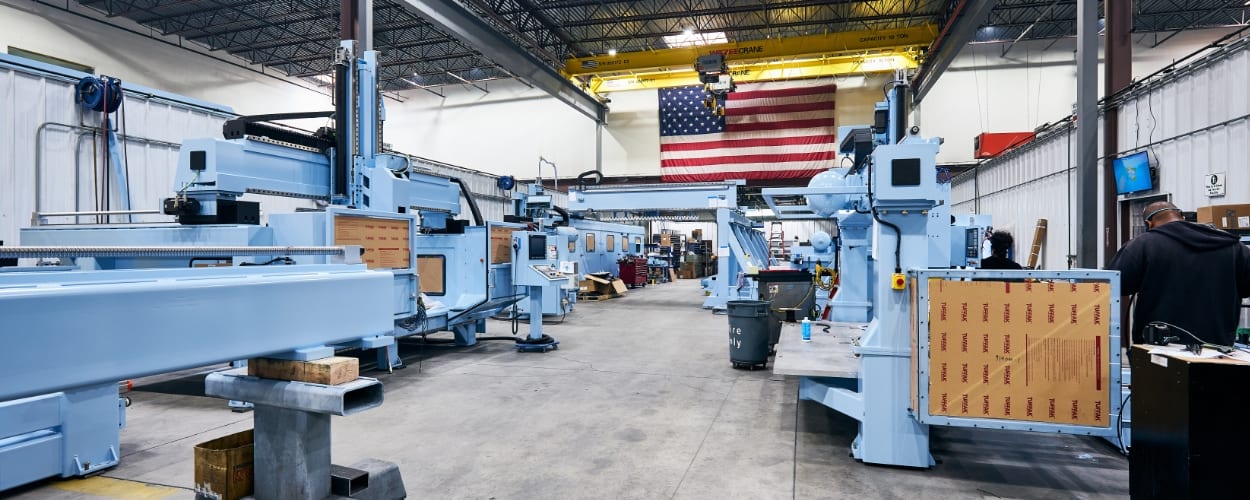Hybrid technology is the bold frontier of manufacturing. However, like most new endeavors, it involves some challenges.
Diversified Machine Systems (DMS) has discovered this firsthand, as we’ve incorporated hybrid processes into our manufacturing. Our hybrid line combines an additive process with a subtractive process. This is new territory—not only for DMS, but for manufacturing in general—and we’ve risen to the occasion with ingenuity and problem-solving.
As DMS has explored the capabilities of hybrid technology, we have faced four major challenges. Each of these challenges has forced us to stretch ourselves to find creative solutions. We’ve learned a lot along the way, and now we’d like to share that knowledge with you.
Feedstock Availability
When using additive processes, feedstock availability presents safety and availability concerns. Many companies use powdered metal, which can pose safety problems. Powdered metal is expensive and must be stored under specific conditions and kept away from all ignition sources. It is a big fire risk.
Other machine owners are locked into using proprietary material. In many cases the machine manufacturer is the only provider of a given material. This drives up costs significantly and forces manufacturers to develop a lifetime relationship with the same vendor.
DMS uses a solid wire feedstock for our additive process that is 1.2 mm in diameter and is commercially available. This standard welding wire can be purchased from most local welding supply stores. From a supply chain perspective, this gives our customers much more freedom. The material is commonly available, safe, and is set at a reasonable market price.
Quality and Dimensional Accuracy
When aluminum is 3D-printed with other 3D processes, the resulting quality may suffer. The final product often struggles with porosity—parts that are not fully dense and are therefore weakened. The dimensional accuracy of 3D-printed parts with traditional metal processes can also be problematic. It is difficult to achieve holding tolerances and good surface finishes.
By incorporating both additive and subtractive processes, DMS mitigates both of these challenges. The deposition process we use reduces the porosity, and the added machining allows for a good surface finish. Rather than attempting to print to the finished part, we rapidly deposit material and then return with the machining spindle to achieve the necessary tolerances and surface finish. This gives a much higher dimensional accuracy.
Speed
Our hybrid process is fast, capable of depositing metal quickly. In fact, we’ve been able to put the material down at a rate of three pounds per hour.
How do we achieve these speeds? Normally, you might 3D print a metal part that isn’t necessarily the finished size. The process of re-finding and re-fixturing that part on a second machine takes a lot of time and attention. With our machine, you are able to finish the entire machining process on one machine. Or, if you need to set up for another operation, you can still machine the necessary locating surfaces and fixturing elements to minimize setup time. Either way, you’re increasing your overall speed by a significant amount.
Qualification
Additive technology is fairly new in manufacturing. This means that the standards to qualify these parts are still being defined. When manufacturing welded components, you have a variety of resources and codebooks to consult to ensure a good product. You could confidently ensure the quality of your product, simply by following the specifications.
Because metal 3D printing is a newer technology, those specifications have not been rigorously defined. When making a part through an additive process, there is not a long history of codes and standards to determine its quality.
DMS uses a welding process for deposition. Because welding has been around for over a century, its codes and standards are mature and accepted. These codes and standards can be applied to our process, which means that we are confident in our ability to ensure the quality of your finished product.
New Frontiers
Additive machines are still a new technology. Many companies use them to make prototypes, but they run into trouble when they try to manufacture finished products. Often the final product is not economically viable, or it isn’t high enough quality.
Diversified Machine Systems is turning out viable, high-quality products with our hybrid line. We did it with our new belt guard, and we’re doing the same with our other products. We’re excited about the potential of this new frontier.
If you want to learn more about DMS’ investment in Hybrid machining contact our team of experts at info@dmscncrouters.com or 855-266-5064.


